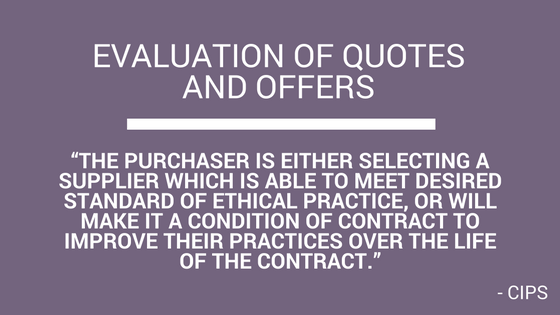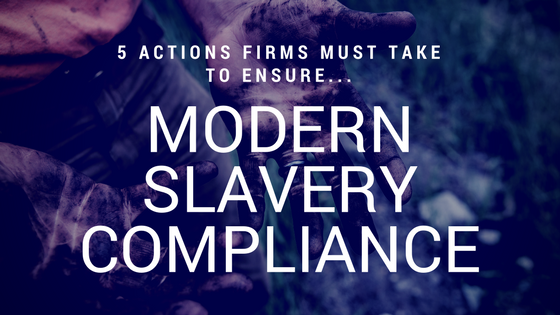
The UK Government has set the turnover threshold at £36 million for companies that have to report on their supply chain modern slavery. Despite this threshold, the Government is still advising companies with smaller turnovers to analyse their supply chains to ensure they are ‘slavery free’.
Modern slavery is still a major concern in the industry, with only 30% of procurement and supply chain professionals believing their suppliers were compliant with the new legislation.
To assist you in the analysis of your current modern slavery policy and process, answer these five key questions on modern slavery:
1 – Do you ask what your supply chain are doing to combat modern slavery?
Requesting information on how your suppliers and contractors are dealing with modern slavery shouldn’t be limited to new suppliers on their PQQ (Pre-Qualification Questionnaire). You should also be asking your existing contractors and suppliers on an annual basis.
Surprisingly, 71% of supply chain and procurement professionals believe their biggest challenge with modern slavery is ensuring the compliance of existing suppliers, according to The Modern Day Slavery Survey 2017 Report.
2 – Do you monitor if they are doing what they say they are?
Desktop and on-site audits are tools that you should be using to ensure your supply chain is abiding by the claims they are making. These audits should look into claims around modern slavery and find evidence of procedures and policies being adhered to.
As Altius’ Managing Director Gary Plant describes, “Having a clear compliance process for your suppliers and contractors to abide by is essential to ensure compliance within your supply chain, ultimately to reduce your exposure and cut your costs.”
“Whether you’re still working from a spreadsheet to monitor supplier compliance, or you have an automated software system, regular communication with your suppliers can help achieve greater levels of compliance.”
3 – Can you prove due diligence and cover your business if the worst were to happen?
While the importance of supply chain audits has never been underestimated in the industry, supply chain and procurement teams are finding it difficult to find time to conduct them and identify potential supply chain risks – two findings that were highlighted in The Modern Day Slavery Survey 2017 Report.
This time constraint means that some supply chain teams are missing out on issues and not completing auditing documentation on an annual basis as they should. Without the activity and paper trail that clears suppliers and contractors to work with you for another year, you and your company are at serious risk.
4 – Could you save money outsourcing this process?
Of course, auditing your suppliers and contractors on an annual basis is a massive undertaking of time and resource. However, to ensure you negate risk, this is a requirement – especially with the severity you and your company face if you fall foul of the new modern slavery legislation.
To ensure your supply chain is compliant to The Modern Slavery Act and amongst other legislations and certifications, outsourcing your compliance process may be an option. This outsourcing could also save your team valuable time and money that could be better spent elsewhere. See how Altius can help with your supplier and contractor assessments.
5 – Are you able to show transparency to your customers on your processes?
If your target client database is businesses over £36 million, the need to comply and create additional assets to show Modern Slavery Act compliance, is almost a compulsory measure. Businesses will want to see thorough processes and clear documentation that every one of your contractors and suppliers adheres to.
This transparency is not always easy to show when companies still rely on traditional database techniques such as logging contractor information on a spreadsheet. For ultimate clarity in order to pitch and win work from businesses over £36 million turnover, it is certainly worth investing in an online system that logs contractor data easily.
Modern Slavery Report
Not sure how compliant you are to the Modern Slavery Act? See how the rest of the procurement and supply chain industry are dealing with the recent legislation and what their biggest challenges in 2017 will be, in The Modern Day Slavery Survey 2017 Report.




















